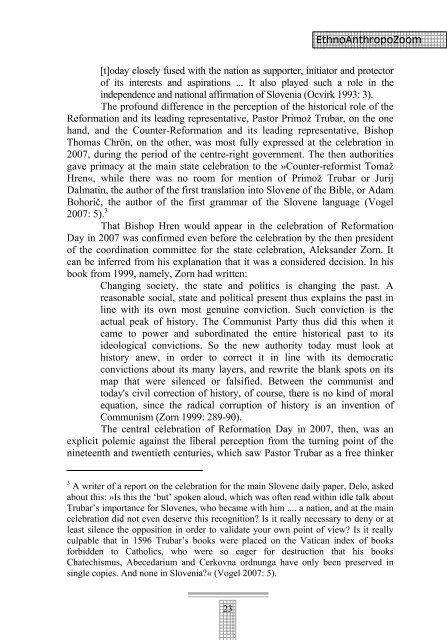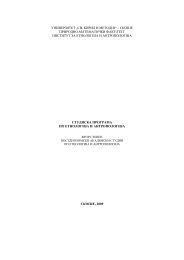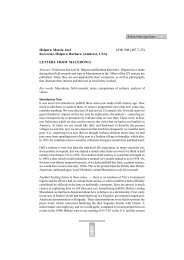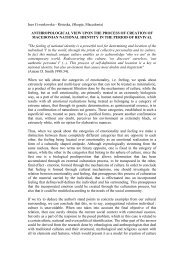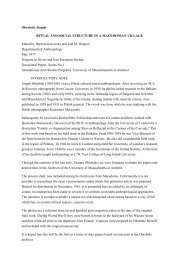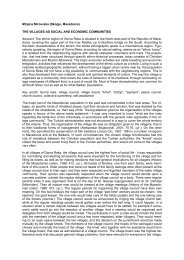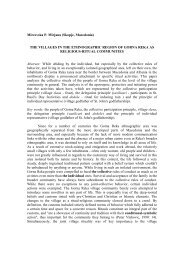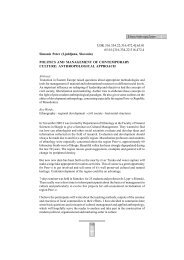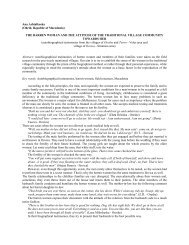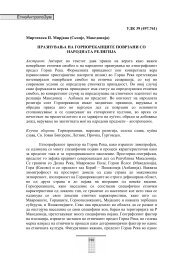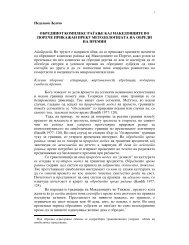Jezernik, Bozidar (Slovenia), The Red and the Black
Jezernik, Bozidar (Slovenia), The Red and the Black
Jezernik, Bozidar (Slovenia), The Red and the Black
Create successful ePaper yourself
Turn your PDF publications into a flip-book with our unique Google optimized e-Paper software.
EthnoAnthropoZoom<br />
[t]oday closely fused with <strong>the</strong> nation as supporter, initiator <strong>and</strong> protector<br />
of its interests <strong>and</strong> aspirations ... It also played such a role in <strong>the</strong><br />
independence <strong>and</strong> national affirmation of <strong>Slovenia</strong> (Ocvirk 1993: 3).<br />
<strong>The</strong> profound difference in <strong>the</strong> perception of <strong>the</strong> historical role of <strong>the</strong><br />
Reformation <strong>and</strong> its leading representative, Pastor Primož Trubar, on <strong>the</strong> one<br />
h<strong>and</strong>, <strong>and</strong> <strong>the</strong> Counter-Reformation <strong>and</strong> its leading representative, Bishop<br />
Thomas Chrön, on <strong>the</strong> o<strong>the</strong>r, was most fully expressed at <strong>the</strong> celebration in<br />
2007, during <strong>the</strong> period of <strong>the</strong> centre-right government. <strong>The</strong> <strong>the</strong>n authorities<br />
gave primacy at <strong>the</strong> main state celebration to <strong>the</strong> »Counter-reformist Tomaž<br />
Hren«, while <strong>the</strong>re was no room for mention of Primož Trubar or Jurij<br />
Dalmatin, <strong>the</strong> author of <strong>the</strong> first translation into Slovene of <strong>the</strong> Bible, or Adam<br />
Bohorič, <strong>the</strong> author of <strong>the</strong> first grammar of <strong>the</strong> Slovene language (Vogel<br />
2007: 5). 3<br />
That Bishop Hren would appear in <strong>the</strong> celebration of Reformation<br />
Day in 2007 was confirmed even before <strong>the</strong> celebration by <strong>the</strong> <strong>the</strong>n president<br />
of <strong>the</strong> coordination committee for <strong>the</strong> state celebration, Aleks<strong>and</strong>er Zorn. It<br />
can be inferred from his explanation that it was a considered decision. In his<br />
book from 1999, namely, Zorn had written:<br />
Changing society, <strong>the</strong> state <strong>and</strong> politics is changing <strong>the</strong> past. A<br />
reasonable social, state <strong>and</strong> political present thus explains <strong>the</strong> past in<br />
line with its own most genuine conviction. Such conviction is <strong>the</strong><br />
actual peak of history. <strong>The</strong> Communist Party thus did this when it<br />
came to power <strong>and</strong> subordinated <strong>the</strong> entire historical past to its<br />
ideological convictions. So <strong>the</strong> new authority today must look at<br />
history anew, in order to correct it in line with its democratic<br />
convictions about its many layers, <strong>and</strong> rewrite <strong>the</strong> blank spots on its<br />
map that were silenced or falsified. Between <strong>the</strong> communist <strong>and</strong><br />
today's civil correction of history, of course, <strong>the</strong>re is no kind of moral<br />
equation, since <strong>the</strong> radical corruption of history is an invention of<br />
Communism (Zorn 1999: 289-90).<br />
<strong>The</strong> central celebration of Reformation Day in 2007, <strong>the</strong>n, was an<br />
explicit polemic against <strong>the</strong> liberal perception from <strong>the</strong> turning point of <strong>the</strong><br />
nineteenth <strong>and</strong> twentieth centuries, which saw Pastor Trubar as a free thinker<br />
3 A writer of a report on <strong>the</strong> celebration for <strong>the</strong> main Slovene daily paper, Delo, asked<br />
about this: »Is this <strong>the</strong> ‘but’ spoken aloud, which was often read within idle talk about<br />
Trubar’s importance for Slovenes, who became with him .... a nation, <strong>and</strong> at <strong>the</strong> main<br />
celebration did not even deserve this recognition? Is it really necessary to deny or at<br />
least silence <strong>the</strong> opposition in order to validate your own point of view? Is it really<br />
culpable that in 1596 Trubar’s books were placed on <strong>the</strong> Vatican index of books<br />
forbidden to Catholics, who were so eager for destruction that his books<br />
Chatechismus, Abecedarium <strong>and</strong> Cerkovna ordnunga have only been preserved in<br />
single copies. And none in <strong>Slovenia</strong>?« (Vogel 2007: 5).<br />
23


